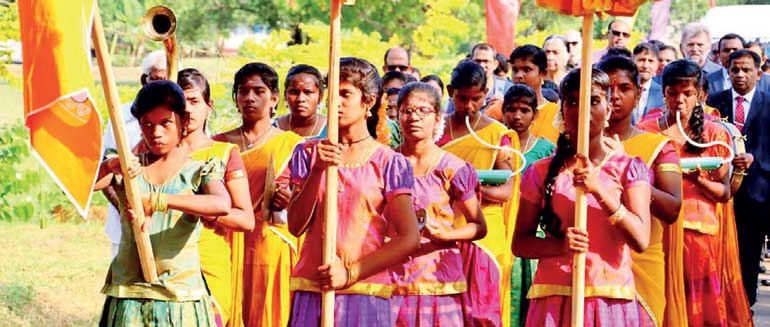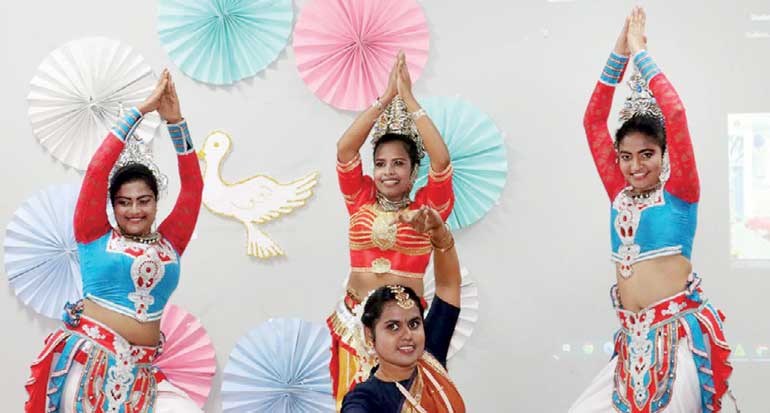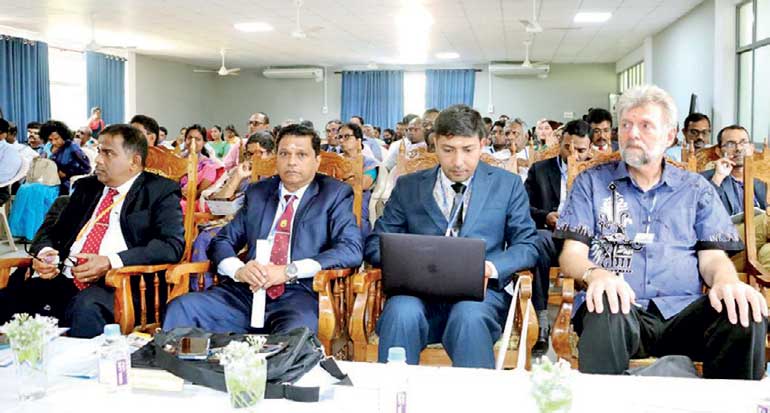Friday Feb 20, 2026
Friday Feb 20, 2026
Saturday, 28 January 2023 01:42 - - {{hitsCtrl.values.hits}}




By Surya Vishwa
The first International Conference on Harmony and Reconciliation 2023 (ICHR 2023) was held on 19 and 20 January, hosted by the Harmony Centre, University of Vavuniya, on the theme of ‘Harmony and Development through Knowledge and Innovation towards Nation Building’.
Established under the University Grant Commission Circular No. 10/2021 in the University of Vavuniya in September 2021 the Harmony Centre is headed by University of Vavuniya Faculty of Business Studies Department of Project Management Senior Lecturer S. Mathivathany.
The central purpose of the centre is to promote understanding of different religious and ethnicities within an academic setting that takes into consideration both the theory and the practice. It seeks to promote the Sri Lankan sprit as opposed to parochial identities and recognises that the message of harmony and reconciliation is relevant today and thereby the need to formulate multi-dimensional approaches to conflict resolution in alignment with the Sustainable Development Goals (SDGs) of the 2030 Agenda for Sustainable Development promoted by the United Nations.
The Vavuniya University seeks to pursue this endeavour through the Harmony Centre, supported by academic and cultural diversification aimed at developing sustainable research that compliments the theoretical as well as the practical from multidimensional global as well as local perspectives.
Under the initiation, planning and direction of University of Vavuniya Vice Chancellor Prof. T. Mangaleswaran, the ICHR 2023 academic conference was held to set a base to reflect on the theme of harmony as relevant to Sri Lankan youth, academia and the wider public.
The conference focused on national unity, development and reconciliation from historical, traditional, theological, economic, social, cultural, political, educational, environmental and other perspectives.
Among the local and international research scholars, experts, artists, religious leaders, devotees and practitioners who attended the two day event which had both academic and cultural aspects, included the Chief Guest, Senior Professor Sujeewa Amarasena who is the current Vice Chancellor of Ruhuna University, Prof. T. Jeyasingham, former Vice Chancellor of the Eastern University of Sri Lanka, Prof. Mohammed Abu Nimer, Director of the Peacebuilding and Development Institute of the American University in Washington, Emeritus Prof. Savitri W.E. Goonesekera, former Vice Chancellor of the University of Colombo, Prof. Rajib Timalsina, Assistant Professor, Department of Conflict, Peace and Development Studies of the Tribhuvan University in Nepal, Prof. Svanibor Hubert Pettan, Chair of the Study group on music and minorities of the University of Ljubljana in Slovenia and Dr. Senthan Selvarajah, Co-director, Centre for Media, Human Rights and Peacebuilding in London and the Gate Foundation in UK. Speaking at the conference inaugural session, Professor Sujeewa Amarasena drew upon the urgent need of making education relevant in Sri Lanka and used as an example the recent murder of a university student by another as an indication to show that violence is in the psyche of especially the population.
From his role as a medical doctor and humanist, he spoke of the ideal contribution academia and the overall education system can make towards developing an intellectual framework for objective analysis which he pointed out was needed for pragmatic development of a nation.
He described the 1st International Conference on Harmony and Reconciliation 2023 as contributing to creating such a foundation stating that the challenge is not so much winning a war but winning the peace.
“Winning a war is easy. But it is winning the peace that is difficult. For winning the peace there must be contribution from across sectors and this is what we must work towards,” Prof. Sujeewa Amarasena stated adding that the youth of tomorrow should be adept at winning peace and harmony; first within themselves and then the outer world. Thereby he noted that the education system should focus on establishing the inner and outer harmony of individuals so as to lay fertile ground for wise, empathetic understanding which is needed to make intelligence and intellect work positively.
The former Vice Chancellor of the Eastern University of Sri Lanka, Prof. T. Jeyasingam analysed the definition of harmony within humans from the lens of the mother earth and all which live within its bosom. He spoke of the very essence of harmony as lying within the heart of nature noting that much could be done to create peace within human hearts by using this harmony between earth and humans. There is much to do within the education system to set about innovation in this regard, he noted. “Much potential exists to look widely at how to build harmony with nature and link this to nationbuilding to determine that our futures are truly sustainable and that we are healthy in mind and body,” Prof. Jeyasingam stated.
“The earth and all the space around it, the air, especially has come under the negative influence of man. We must understand that human development should go aligned with nature and not against it,” Prof. Jeyasingam said.
“Have we understood that we are just a smallest fragment of nature? With all our expertise what can we do when nature strikes? What could we do in the tsunami? What can we do against a cyclone? A lifetime of expertise of man faces just a minute of nature’s wrath and we become utterly helpless. Nature takes only few minutes to strike us into a helpless state. After such an event – say for example the tsunami we faced, see how nature went back to its usual calm,” he said.
“Fifteen minutes after the 2004 December tsunami, I closely observed the sea. It had gone back to normal. No one would ever believe that what had occurred had happened and that hundreds had been killed by the sea.”
“Humans must realise that harmony is a concept that is applicable to nature and man in unison. We cannot do terrible things to either nature or man and expect harmony to reign. We have to think. We have to act with deep thinking,” Prof. Jeyasingam stated. He also mentioned the existence of Mother Nature in pristine condition in segments of the land of the Vavuniya University which are nature conservation areas and commented on the many options for nature-based tourism within the university.
Such productive initiatives are those that could be conceptualised as follow up practical project activities connected to the ICHR 2023 academic conference, he noted. Professor Mohammed Abu-Nimer of the American University, School of International Service in International Peace and Conflict Resolution in Washington, DC, in his keynote address spoke of the international perspective connected with conflict resolution which is now a global academic discipline. He focused on both of the theory and the practice, describing conflict resolution as a fundamental requisite for credible human development. Within this macro framework he stated that the core need is for nurturing human linkage and individual transformation, pointing out that this is the micro element that influences and propels larger scale social systems positively.
Emeritus Prof. Savitri E.W. Goonesekera, former Vice Chancellor of the University of Colombo spoke in depth of the interpretation of justice and its relevance. There were panel discussions and presentations of academic research papers covering many aspects of harmony, unity, peacebuilding and sustainable development.
The schedule of conference activities had two key components which comprised of the research sessions and the Harmony Exhibition. The research sessions were designed to focus less on paper reading and lectures but instead the format was geared towards deeper insights into a topic.
The research sessions featured in the conference consisted of two types; the panel sessions and the discussion platform where the panel session was on the practice segment and the discussion was based on the theoretics. The panel sessions conducted concurrently at the conference venue provided an opportunity for multiple presenters to speak on common themes of the conference. Presentations by the panellists were followed by question and answer sessions that opened up to the audience of academics.
The discussion sessions were designed to provide an in-depth look at a specific conference topicfrom one person’s research or practice. Each session followed an interview format in which a moderator interviewed an expert to explore his/her work, knowledge and personal stories. The moderator also engaged the audience in questions and comments.
Together with high quality and innovative research, the conference hosted a harmony show featuring exhibition of art and entrepreneurship, especially by women. The art exhibition had many artists, especially youth presenting work of peace, harmony and reconciliation through their visual stories.
Conflict resolution and peace building
Some of the conference themes included Social Cohesion and Reconciliation for Development, Communal Harmony and Social Development, Unity of Diversity towards Nation Building, Peace and Sustainable Development, Harmony with Nature, Role of Art and Culture in Peace Building, Role of Digital Media toward Peace Building, Literature for Peace and Strategic Partnerships for sustainable development.
The conference delegates attended a reception and cultural events hosted by the organisers which represented musical and dance based talents of youth and children of Vavuniya as well as the university. Vavuniya University is multicultural in an essence and is represented by Sri Lankan Tamil, Sinhala and Muslim students.
The Weekend FT and the Harmony page will be publishing detailed stories in the weeks to come connected with the academic and practice based deliberations made at the ICHR conference.